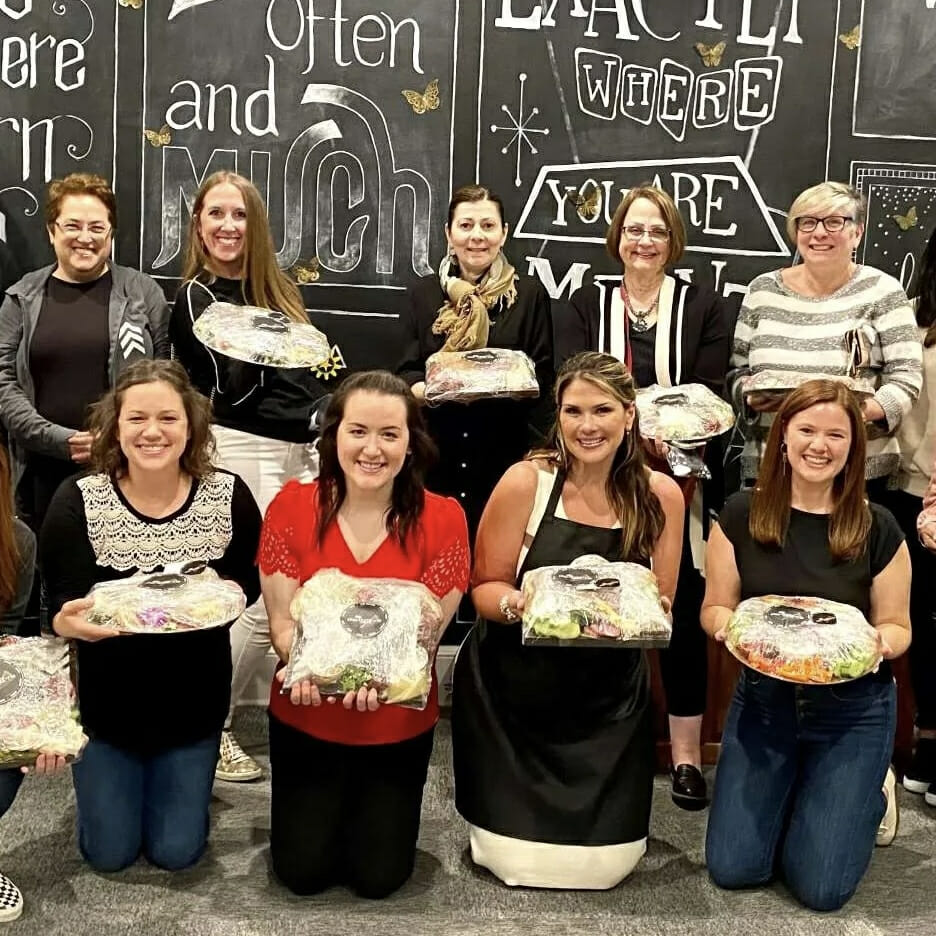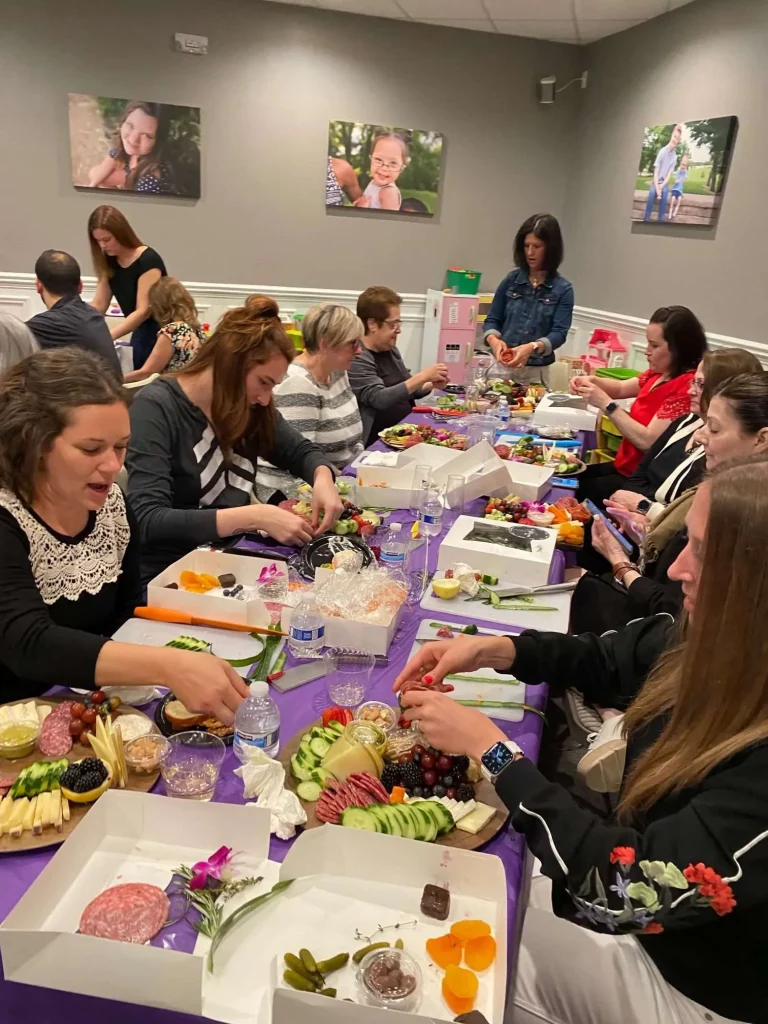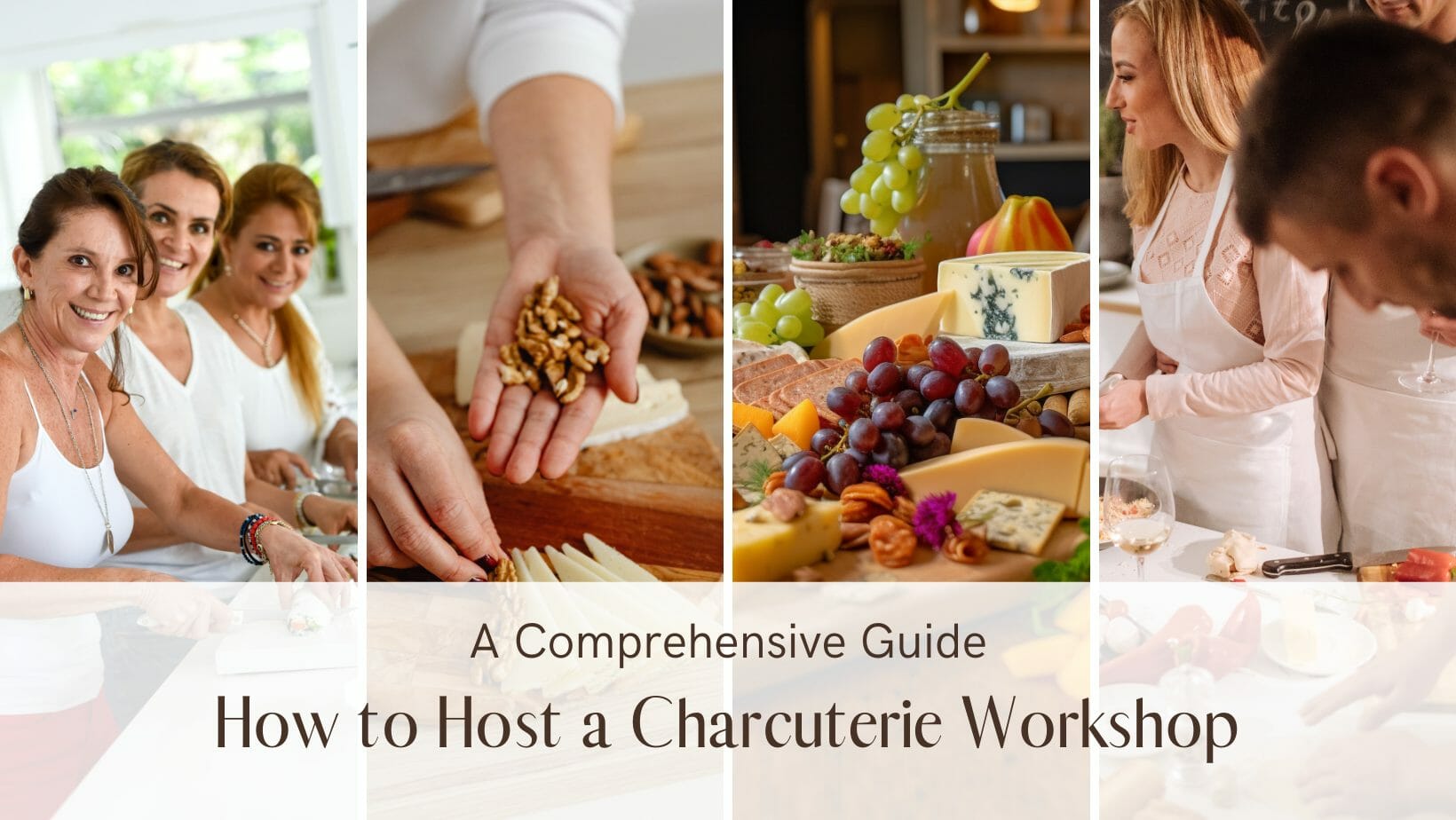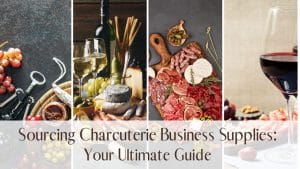Learning how to host a charcuterie workshop can be an amazing way to break into the industry, even if you are NOT a licensed charcuterie business working out of a commercial location. And if you are, workshops can be a game-changer for your business. When done correctly, these high-profit, low-cost classes can be a superb source of ongoing revenue and devoted, returning clients.
This guide will lead you through the important underlying steps to hosting workshops that attendees will rave about and always want to come back for more.
LEARN MORE: Enroll in our NEW, powerful Local Charcuterie Workshop Training Masterclass that will give you all the knowledge and tools you need to start, host and run profitable charcuterie classes for both public and private events. All Easy Edit Templates Included! Click To Read More >>
Table of Contents [CLICK HERE TO OPEN]
- The Benefits of Offering Charcuterie Workshops
- Workshop Ideas and Themes
- Developing Your Curriculum Plan & Outline
- Setting Up Your Space
- Tips for approaching existing spaces
- Class Setup Essentials
- Sourcing The Right Supplies
- Pricing Your Workshop
- Promoting Your Charcuterie Workshop
- Building Partnerships and Collaborations
- Creating Lively Events & Happy Customers
- Getting Them Coming Back For More

The Benefits of Offering Charcuterie Workshops
Because legal red tape and local commercial kitchen requirements can often be a massive roadblock to entering the industry, many find they break in through the side-door by offering local workshops! As each attendee preps, slices and styles their own uncut goodies, there is almost zero barrier to entry for anyone who wishes to get started.
And if you are already a grazing professional, offering live workshops you can add an extra income stream and attract new customers in a unique way, while also boosting your brand's visibility. As you establish yourself as a charcuterie expert, your attendees may become loyal catering customers, creating a delicious cycle of repeat business and positive word-of-mouth.
Workshop Ideas and Themes
Having a fun theme can give you a great reason as to WHY folks will want to attend. Using themes also provides people with a reason to attend multiple classes without feeling like they are experiencing the same thing over and over. Below are some of our favorites, but don't limit yourself to just these, let your imagination run free!
Seasonal Sensations: Create workshops around seasonal ingredients, showcasing how to incorporate them into charcuterie boards for different times of the year as well as holidays.
Anniversaries, Birthdays Team Building: Offering workshops with themes for anniversaries, birthday parties (especially children) and corporate team building can keep your classes in demand all year.
Themed Charcuterie: Design workshops focusing on specific themes, such as movie nights, holiday celebrations, or wine and cheese pairings.
International Flavors: Explore the world of charcuterie by highlighting regional specialties from various countries or cultures.
Special Diets: Cater to those with dietary restrictions by offering workshops on gluten-free, vegan, or kosher charcuterie boards.
Developing Your Curriculum Plan & Outline
To stay organized and prepared, it's helpful to outline your workshop's key aspects in advance. While you don't need a written script, a simple outline can clarify the materials you'll need and remind you of the themes and techniques you've covered. This ensures a structured and engaging experience that is both fun and professional.
Introduction to Charcuterie: Start with the basics, explaining the history and tradition of charcuterie, along with an overview of popular meats, cheeses, and accompaniments.
Special Facts About This Theme: Sharing info and simple stories about what makes your selected theme fun or interesting is a fantastic way to captivate everyone who attends. Elements like this are also the perfect way of truly differentiating one class from another.
How Can They Use These Techniques: An often overlooked aspect of teaching is mention just how these nifty charcuterie skills can spice up their everyday lives. This single thing might just be the secret ingredient that keeps your attendees coming back for more. After all, who doesn't enjoy a delicious blend of knowledge and fun?
Board Assembly Techniques: Demonstrate various techniques for arranging ingredients, including color coordination, balancing flavors, and creating visually appealing presentations.
Direct Guidance: Help attendees build their own charcuterie boards, offering guidance and feedback as they work. Walking around the room and directly engaging with each person is the perfect way to connect and build trust.
Pairing Recommendations: Share your expertise on pairing different meats, cheeses, and accompaniments with beverages such as wine, beer, or non-alcoholic options.
Food Safety and Storage: Educate attendees on proper food handling, storage, and safety to ensure they can confidently recreate their charcuterie creations at home.
By weaving together the above elements and genuinely connecting with your students, you'll create a show-stopping workshop that masterfully blends top-notch information and a pinch of pizzazz. Not only will you enchant your attendees, but you'll also flaunt your expertise and professionalism. The cherry on top? This delightful mix tends to cultivate consumer trust and spark buzzworthy conversations – the perfect recipe for success!
LEARN MORE: Enroll in our NEW, powerful Local Charcuterie Workshop Training Masterclass that will give you all the knowledge and tools you need to start, host and run profitable charcuterie classes for both public and private events. All Easy Edit Templates Included! Click To Read More >>
Setting Up Your Space
Creating an inviting and functional space is essential to providing a delightful experience. Let's explore how to set up the perfect charcuterie class and source the right supplies. If you have your own space already set up, you can skip this section. However, if you need to find a spot to call home, we will cover everything you need to know.
First, consider the size of the space. You'll want to ensure that you have enough room for all of your attendees to move around comfortably and participate in hands-on activities. The space should also have adequate seating and tables for your guests to enjoy their charcuterie creations. Additionally, look for a space that has ample natural light and ventilation to create a welcoming and comfortable atmosphere.

Workshop space factors to keep in mind:
-
- Size of the space
-
- Seating and tables
-
- Natural light and ventilation
-
- Overall look/feel of the location to match your brand
Next, think about the location. Ideally, you'll want to find a space that is convenient and easily accessible for your attendees. This may mean choosing a space that is located in a popular shopping or dining district, or near public transportation. Additionally, consider the surrounding area – are there nearby businesses or attractions that could attract more foot traffic to your workshop?
Helpful Location Factors:
-
- Convenience and accessibility
-
- Proximity to public transportation
-
- Nearby businesses or attractions
Once you've identified a few potential spaces, it's time to approach the owners to see if they would be open to hosting your workshop. Start by researching the space and the business to get a sense of their values and priorities. Then, reach out with a friendly and professional email or phone call to introduce yourself and your business, and explain what you're looking for in a workshop space.
Tips for approaching existing spaces:
-
- Research the space and the business
-
- Introduce yourself and your business
-
- Explain what you're looking for in a workshop space
-
- Be friendly and professional in your communication
By keeping these factors in mind and approaching potential workshop spaces in a friendly and professional manner, you'll be on your way to finding the perfect location for your charcuterie workshops in no time.
Class Setup Essentials
Adequate Space: Choose a venue with enough room for participants to comfortably assemble their boards, ensuring there's ample space for socializing and learning.
Seating and Workstations: Provide seating and individual workstations equipped with cutting boards, utensils, and other necessary tools.
Visual Aids: Enhance your workshop with visual aids, such as a large screen for displaying instructional videos or slides, and sample charcuterie boards for inspiration.
Food Display: Offer the uncut goodies inside individual boxes placed where each person will be sitting. Set up a visually appealing buffet-style spread of ingredients, making it easy for participants to select and gather items for their boards.
Hygiene and Safety: Provide handwashing stations, sanitizing wipes, and gloves to maintain a clean and safe environment throughout the workshop.
Sourcing The Right Supplies
Quality Ingredients: Partner with local vendors, farmers, and artisans to source fresh, high-quality meats, cheeses, and accompaniments for your workshop.
Eco-Friendly Supplies: Opt for reusable or eco-friendly serving ware, utensils, and plates to minimize waste and create a more sustainable experience.
Customizable Takeaways: Provide attendees with a keepsake from the workshop, such as a branded cutting board or personalized apron, to make the event memorable.
Printed Materials: Offer handouts or recipe cards with detailed instructions, tips, and ideas for participants to reference during the workshop and take home for future use.
By carefully planning your charcuterie workshop space and sourcing the right supplies, you'll create an environment that fosters creativity, learning, and enjoyment for everyone involved.
LEARN MORE: Enroll in our NEW, powerful Local Charcuterie Workshop Training Masterclass that will give you all the knowledge and tools you need to start, host and run profitable charcuterie classes for both public and private events. All Easy Edit Templates Included! Click To Read More >>
Pricing Your Workshop:
Crafting the perfect pricing and promotional strategies are essential for ensuring your charcuterie workshops are both profitable and well-attended. Let's delve into the world of pricing and marketing for your workshops.
Cost Analysis: Begin by calculating the total cost of your workshop, including ingredients, supplies, venue rental, and any additional expenses.
Competitive Pricing: Research other charcuterie workshops in your area to gauge the going rates and position your pricing competitively, while still ensuring profitability.
Value Perception: Consider the perceived value of your workshop, focusing on the unique selling points, such as exclusive ingredients, expert instruction, or personalized experiences, and price accordingly.
Group Discounts: Offer group rates or tiered pricing to incentivize larger bookings and maximize attendance.
Your Profit & Your Time: Never forget to include your desired profit margin as well as your cost for the hour or so of hands-on teaching.
Promoting Your Charcuterie Workshop
It's not enough to create an amazing workshop, you also need to get the word out! In this section, we'll discuss some effective ways of filling those seats to ensure they're well-attended and successful. From social media to influencers and email marketing, we'll cover all the bases so you can focus on creating an exceptional experience for your attendees.
Social Media:
Use visually appealing images and engaging content to promote your workshops on platforms like Instagram, Facebook, and Pinterest, where foodies and charcuterie enthusiasts abound.
-
- Share behind-the-scenes content, such as photos or videos of workshop preparation, to give followers a sneak peek of what to expect
-
- Create visually stunning graphics that showcase your charcuterie offerings and workshop details
-
- Run social media contests or giveaways that require participants to sign up for your workshops
-
- Utilize popular food-related hashtags to increase visibility and attract new followers who are interested in charcuterie
Local Partnerships:
Collaborate with local businesses, such as wineries or gourmet food shops, to cross-promote your workshops and tap into their customer base.
-
- Host joint events with local wineries, featuring your charcuterie offerings and promoting upcoming workshops.
-
- Create special discounts or promotions for customers of partnering businesses who sign up for your workshops.
-
- Offer to provide your charcuterie boards or platters for local events hosted by partnering businesses, and include information about your workshops in the display.
-
- Collaborate on social media by sharing each other's content and promoting each other's businesses and events.
-
- Host a joint workshop with a partnering business, such as a wine pairing event or cooking class, to attract a wider audience.
By combining the right pricing strategy with effective promotion, your charcuterie workshops will be primed for success, attracting eager participants and driving revenue for your business.
View this post on Instagram
A post shared by Sarah B. Charcuterie | Sarah Ferguson (@sarahbcharcuterie)
Building Partnerships and Collaborations
Establishing strong partnerships and collaborations can be an effective way to grow your charcuterie workshop business while offering attendees a well-rounded and memorable experience. Let's explore how to identify potential partners and leverage these collaborations for business growth.
Complementary Businesses: Seek out local businesses that complement your charcuterie workshops, such as wineries, breweries, cheese shops, or gourmet food stores, and propose mutually beneficial collaborations.
Local Chefs and Experts: Reach out to talented local chefs, sommeliers, or food artisans who can bring their unique skills and knowledge to your workshops, enhancing the overall experience for attendees.
Event Venues: Connect with event spaces or restaurants that could host your workshops, providing a comfortable and attractive environment for participants to learn and enjoy themselves.
Community Organizations: Partner with local culinary schools, food festivals, or community organizations to co-host workshops and tap into their networks for increased visibility and credibility.
By forging strategic partnerships and collaborations, you can expand your charcuterie workshop business's reach, enhance the attendee experience, and ultimately drive growth and success.
Creating Lively Events & Happy Customers:
Creating memorable and engaging charcuterie workshops is key to building customer loyalty and ensuring repeat business. In this section, we'll explore strategies for engaging workshop attendees and targeted retention techniques to keep your customers coming back for more.
Interactive Activities: Encourage hands-on participation in your charcuterie workshops, allowing attendees to practice their newfound skills and ask questions throughout the session.
Personalized Touches: Tailor your workshop content to the interests and preferences of your attendees, making the experience feel personalized and unique.
Storytelling: Share entertaining anecdotes, historical tidbits, or fun facts related to charcuterie, adding depth and personality to your workshops.
Social Media Integration: Encourage attendees to share their workshop experiences on social media, using branded hashtags or geotags to boost engagement and visibility.
Getting Them Coming Back For More
Your workshop was a huge success? No surprise there! Your awesomeness paired with our guide, success was inevitable! But let's not stop just yet. To ensure your attendees remember this fantastic experience and eagerly anticipate the next one, we've got some friendly tips you can follow:
Post-Workshop Follow-ups: Send personalized follow-up emails or messages after the workshop, thanking attendees for their participation and soliciting feedback to continuously improve your offerings.
Exclusive Discounts and Promotions: Offer workshop attendees special discounts or promotions for future events, enticing them to return and experience more of your charcuterie offerings.
Loyalty Programs: Implement a loyalty program that rewards frequent attendees with perks, such as free workshops, discounted merchandise, or priority access to new events.
Targeted Content Marketing: Share valuable and engaging content, such as recipes, tips, or behind-the-scenes stories, through email newsletters or social media channels, keeping your brand top of mind for past attendees.
Community Building: Foster a sense of community among your attendees by hosting exclusive social events, creating online forums or groups, or collaborating on charity events, giving them a reason to stay connected with your brand.
By incorporating these engaging strategies and targeted retention techniques, you'll create unforgettable charcuterie workshops that keep attendees excited about your business and eager to return for more.
To wrap it up, there's no denying the impact hosting charcuterie workshops can have on your business. From expanding your customer base to generating additional revenue, these delightful events provide an unparalleled opportunity to share your passion and expertise with eager attendees.
Remember to plan, promote, and engage with your students for a charcuterie experience that's nothing short of extraordinary. Now's the perfect time to put your skills to work and start hosting workshops that leave a lasting impression and the taste of success in everyone's mouth.
LEARN MORE: Enroll in our NEW, powerful Local Charcuterie Workshop Training Masterclass that will give you all the knowledge and tools you need to start, host and run profitable charcuterie classes for both public and private events. All Easy Edit Templates Included! Click To Read More >>







